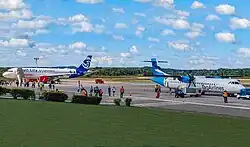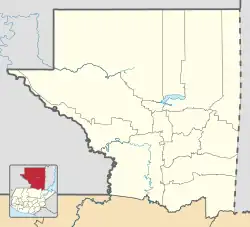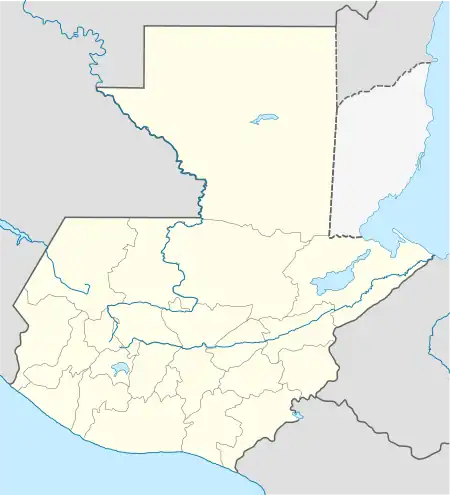Mundo Maya International Airport Aeropuerto Internacional Mundo Maya | |||||||||||
|---|---|---|---|---|---|---|---|---|---|---|---|
 | |||||||||||
| Summary | |||||||||||
| Airport type | Military/Public | ||||||||||
| Operator | Dirección General de Aeronáutica Civil | ||||||||||
| Location | Flores, Guatemala | ||||||||||
| Focus city for | TAG Airlines | ||||||||||
| Elevation AMSL | 118 m / 387 ft | ||||||||||
| Coordinates | 16°54′50″N 089°51′59″W / 16.91389°N 89.86639°W | ||||||||||
| Map | |||||||||||
 MGMM Location in Petén Department  MGMM Location in Guatemala | |||||||||||
| Runways | |||||||||||
| |||||||||||
| Statistics (2022) | |||||||||||
| |||||||||||
Mundo Maya International Airport (Spanish: Aeropuerto Internacional Mundo Maya, IATA: FRS, ICAO: MGMM), formerly Flores International Airport as indicated by its 3-letter code, is an international airport located in the suburb of Santa Elena, in the city of Flores, Guatemala. It serves national and international air traffic for the areas of Flores, Santa Elena, and San Benito, as well as all the Maya sites of Tikal or Yaxhá and destinations such as Guatemala City and Belize.
The airport lacks many amenities compared to other airports its size. It only has 1 small cafe landside and a large sitting area airside. Despite its size and lack of jetbridges, lounges, and restaurant it is still Guatemala's second busiest airport.
Mundo Maya Airport, like other airports in Guatemala, is going through some expansions, to provide a better service to passengers and airlines, so it will be able to accept a greater number of flights and larger aircraft. In 2012, the ICAO airport identifier for Mundo Maya International Airport changed from MGTK to MGMM.[3]
Airlines and destinations
| Airlines | Destinations |
|---|---|
| Avianca Guatemala | Guatemala City |
| TAG Airlines | Cancún, Guatemala City, Mérida |
| Tropic Air | Belize City |
Statistics
Mundo Maya International airport is the country's second busiest airport and it is one of the busiest airports in Central America. In 2018, Mundo Maya International Airport reported 144,772 passengers, a 5.4% yearly increase
 |
| Source: Directorate General of Civil Aviation |
| Number of passengers | Percentage change | Number of movements | Percentage change | |
|---|---|---|---|---|
| 2015 | 111,075 | N.A. | 6,826 | N.A. |
| 2016 | 113,444 | 6,915 | ||
| 2017 | 137,348 | 7,042 | ||
| 2018 | 144,772 | 7,851 | ||
| Source: Directorate General of Civil Aviation of Guatemala | ||||
Accidents and incidents
- On 30 September 1977, a Douglas C47A TG-AKA of Aviateca was damaged beyond economic repair in a landing accident. One of the three crew members was killed.[4]
- On 26 July 1978, a Douglas DC-3 TG-AFA of Aviateca overran the runway following a birdstrike on take-off and was reported to have been damaged beyond economic repair.[5] The aircraft was later repaired and returned to service.[6]
- On 7 May 1979, a Douglas DC-3 TG-SAB of TAPSA was substantially damaged in a landing accident when it departed the runway and collided with a car. The aircraft was subsequently repaired and returned to service.[7]
- On 18 January 1986, a Sud Aviation SE-210 Caravelle III from Aerovias, crashed into a hill on its final approach, about 8 km from the airport. All 93 passengers and crew on board were killed, making it the worst air disaster in Guatemalan history.[8]
See also
References
- ↑ MGTK – MUNDO MAYA Internacional
- ↑ (in Spanish)Estadísticas, Dirección General de Aviación Civil de Guatemala
- ↑ Jeppesen. JeppView. Version 3.7.5.0.
- ↑ "TG-AKA Accident description". Aviation Safety Network. Retrieved 5 August 2010.
- ↑ "TG-AFA Accident description". Aviation Safety Network. Retrieved 1 August 2010.
- ↑ "Photo: Aviateca, Douglas DC-3 TG-AFA". Airline Fan. Retrieved 2 August 2010.
- ↑ "TG-SAB Accident description". Aviation Safety Network. Retrieved 29 July 2010.
- ↑ "Guatemala crash toll now put at 93". The New York Times. 20 January 1986. Retrieved 1 October 2013.
External links